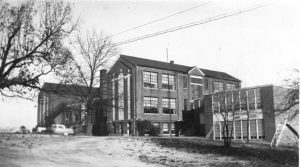2 Chapter Two: Moving Away

The Old Clara Carpenter Elementary School — chantanoogan.com
As mentioned previously, Doug’s family moved to Chattanooga, TN, when he was in the second grade. His father Hudson was in management training for Blue Plate. While in Fish Creek, they attended the Lutheran Church his grandma helped found, in Chattanooga they attended a Seventh Day Adventist Church, exposing Doug to new religious ideas.
While Doug’s father was training in Chattanooga, he would drive a truck around town to deliver the Blue Plate products to the store–jams, jellies, coffee, etc. Doug loved going with his father, and always went with him in the morning truck rounds. His other siblings stayed home, preferring to sleep in past 6 am. Doug recalled how one morning they were driving across the Market Street Bridge in Chattanooga. That morning on the bridge, a black man was being hung.
Doug on the hanging – 14 seconds
The next morning, Doug and Gary went to the nearby drugstore–Whities– to buy cigarettes; they would each buy one cigarette for a nickel apiece. The drugstore owner was a member of the Klu Klux Klan. Doug remembers hearing the owner talk with some of his friends about the hanging and bragging about how he had helped do it. Not only was he witness to the racial violence of the South at a young age, but he was also shown just how twisted and horrible the minds of the extreme racists were, to think that hanging a man was an accomplishment.
Doug also attended Clara Carpenter Elementary School, which was his first time seeing a “brick and mortar, two-story” school. Doug recalls getting lost, the school was so large. The kids there often teased him for being a “GD Yankee,” the GD standing for a particular swear set of swear words. With Jim Crow laws being in full swing in the South at the time, Doug attended an all-white school. This was a contrast from Door County, where there was barely enough funding or children to justify a two-room school, let alone segregated ones.
Doug’s principal in grade school was Mr. Smith. He recalls Mr. Smith for his bullwhip and paddle, both of which he would use against his misbehaving students.
Doug discussing Mr. Smith – 11 seconds
When school would get out, all the children would leave school to walk home. The black school got out before the white one, so when the white schools would let the children out the black students were often walking past on their way home. If the black students were walking past, Mr. Smith would keep his students in the schoolyard until they had all passed. The first day it happened, Doug didn’t know this, so he just walked out of the yard to go home. Mr. Smith yelled at him, asking “what are you doing, messing with them n–?”
Mr. Smith would often try and use his bullwhip against the black students. Being kids, they would mess with him, crying “you can’t catch me!” and similar phrases. Doug got right in with them, playing along. In return, he got the whip. Doug didn’t learn his “lesson,” however, and he and Gale went right along playing with the black kids in the neighborhood after school. Being raised in Door County, they had no concept of the heavy racism of the South and had played with whites, blacks, and Hispanics alike. This openness to other races did not go unnoticed, however.
Doug on people’s reactions to him and Gale playing with black kids – 10 seconds
People began to talk, and no “self-respecting white” would associate with the family anymore. Hudson eventually decided to move the family to another part of town, to try and escape the rumors and discrimination. While they had only moved a few blocks away, Doug says “in a big city, we were lost.”
They ended up living in an apartment right by the minor league baseball stadium–the Chattanooga Lookouts. Because of their proximity to the stadium, during baseball season Doug and Gary would get a job parking cars. While not driving and parking the cars like valets, the two brothers would hold a parking spot, and for a nickel, they would let someone park there. These would be parking spots in the neighborhood close to the stadium, allowing fans to avoid the high cost of the stadium parking lot, as well as the crowds.
After Doug’s father finished management training, the family moved to Winchester, Tennesee. In Winchester, during the cotton season, the school would be let out. This allowed all the poor children–primarily blacks–to be out of school in order to go pick cotton. The kids from wealthy families would enjoy the time off, and not work. Doug’s father, being from Door County where all the kids would pick cherries when they were off from school, was not going to let his kids “sit around” when there was work to be done and money to be made. So Doug and all his siblings would pick cotton with the poor and blacks. Doug recalls how the older black men would take him under their wing, and teach him the best ways to pick cotton.
Doug recalls that his biggest problem was not understanding the “why” of it. He states thinking, “What is it about these people that makes them so bad, that I’m supposed to hate them? Becuase they seem nice, and they’ve always been good to me.” He could not understand why such good people could be hated with such passion, and all simply because of the color of their skin.
The family stayed in Winchester for four years–long enough for all the kids to pick up Southern accents–and Doug attended a school in Winchester while they were there. However his father, with his drinking habits, eventually ended up getting himself fired, and it was back to Wisconsin they went.
